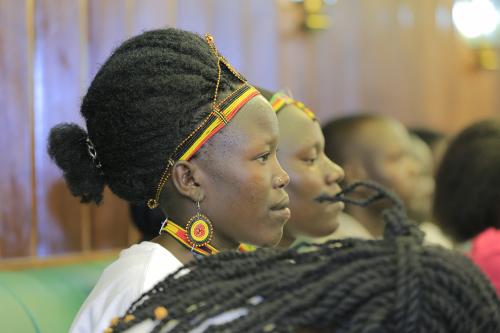Lukore Health Centre; a Home for Great Health Services!
Lukore Health Centre; a Home for Great Health Services in Agago district!
Over 750,000 residents of Agago Town Council in Agago district - Northern Uganda had for years faced challenges in accessing quality health services, until they took it upon themselves to reach out to the local government authorities to demand a remedy. Their only health facility, Lukole Health Centre III, was facing a number of hurdles, ranging from lack of lighting and inadequate beds, to lack of delivery beds and proper storage for vaccines, among others. This is no more today and the centre’s acting in-charge, John Bosco Otim, attributes the improvement to the aggressiveness of community journalists and Activista in the area, whom he says, engaged the leaders at various levels to see realise this change.
Over 750,000 residents of Agago Town Council in Agago district - Northern Uganda had for years faced challenges in accessing quality health services, until they took it upon themselves to reach out to the local government authorities to demand a remedy. Their only health facility, Lukole Health Centre III, was facing a number of hurdles, ranging from lack of lighting and inadequate beds, to lack of delivery beds and proper storage for vaccines, among others. This is no more today and the centre’s acting in-charge, John Bosco Otim, attributes the improvement to the aggressiveness of community journalists and Activista in the area, whom he says, engaged the leaders at various levels to see realise this change.
Journey to success
In November 2018, David Komakech (an activista) and Pauline Akello (a community journalist) visited Lukole Health Centre III to assess its condition, following complaints from the community especially mothers. Among the gaps exiting at the centre included lack of a refrigerator to store the immunisation vaccines, lack of electricity in some of the hospital blocks majorly; Out-Patient Department (OPD) and the General Ward affecting night duties in maternity wards, limited patients’ beds, low staffing at the hospital and poor sanitation at the hospital.
Komakech reveals that all expectant mothers and other patients were required to go with torches at night for any services since the centre had no lighting.
“The centre already had electricity in one block, but other blocks had not been connected to the grid, including the general ward and maternity ward,” he says.
However; Otim (in charge) notes that many mothers used to visit traditional birth
attendants while others used to deliver on their own; which at times would lead to death of a mother and child.
Involving leaders
Towards the end of November 2018, Komakech together with other community journalists and grassroots monitors, organised a dialogue with the health centre and district leadership, who promised to intervene.
The health centre receives about 1,200 patients every month, way over the targeted 800. However, it has only eight technical staff and five support staff.
Impact of the dialogue
Komakech says following the two meetings, the district council directed the district head of health services to ensure that village health teams (VHTs) start registering all pregnant mothers and track places of deliveries. The council accordingly passed a by-law imposing a fine of sh30,000 on all expectant mothers who deliver from their homes.This was reached upon after a functional lighting system was installed at the health centre. The midwife at the health centre, Anjilina Akello confessed that the directive saw deliveries per month increase from 15 to about 30.
The health department also procured a brand new refrigerator and a solar power system for the health centre for storage of Vaccines. Today, the health centre offers four outreaches every month to do vaccination, HIV testing and counseling.
The health centre in addition got two new maternity beds donated by Pride Microfinance and one new modern delivery bed; from UNICEF, Korea International Cooperation Agency (KOICA) and Association of Volunteers in International Service (AVSI).
Magdalena Akello, 28, an expectant mother and resident of Agago town council, says it is the second time she will be delivering from the facility, which she says was in bad state years ago. "There was no power. Patients who used to come at night for medication would not get services since midwives had no light. We were required to go with our own torches or candles.," she says. Through this, AAIU has partly achieved the Strategic Objective 3 of strengthening citizen actions to deepen democracy and hold state and political leaders accountable for social justice.
